|
|
|
Sort Order |
|
|
|
Items / Page
|
|
|
|
|
|
|
| Srl | Item |
| 1 |
ID:
091383
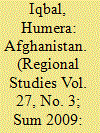

|
|
|
| 2 |
ID:
071292
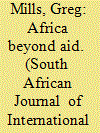

|
|
|
| 3 |
ID:
144327
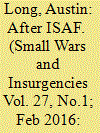

|
|
|
|
|
| Summary/Abstract |
The conclusion of the International Security Assistance Force (ISAF) mission in Afghanistan at the end of 2014 has generated substantial uncertainty about the duration and level of international commitment to Afghanistan. The fate of local allies of international forces is therefore deeply in doubt. This article is of necessity speculative rather than empirical, but it attempts to draw on the history of previous intervention in Afghanistan as well as more general patterns of local and external alliance to sketch plausible scenarios for the fate of local allies. It proceeds in four parts. First, it draws distinctions between different types of local allies in Afghanistan based on position and relationship to the Afghan state and an external actor. Second, it examines the Soviet withdrawal from Afghanistan for relevant lessons for the fate of local allies. Third, it presents a scenario based on the foregoing that assumes there will be an ongoing small but significant international military presence and accompanying resources. Fourth, it presents a scenario that assumes there will be no or minimal international military presence and accompanying resources.
|
|
|
|
|
|
|
|
|
|
|
|
|
|
|
|
| 4 |
ID:
070790


|
|
|
| 5 |
ID:
140332
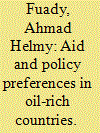

|
|
|
|
|
| Summary/Abstract |
This paper analyses the role of foreign aid in assisting development in two oil-rich countries: Indonesia and Nigeria. It seeks to understand the way foreign aid provided assistance to transform Indonesia from a ‘fragile’ state in the 1960s into one of the ‘Asian Tigers’ in the mid-1990s, and why it did not prevent Nigeria from falling into ‘African Tragedy’. The paper argues that foreign aid may help not only to finance development, but also to navigate policy makers’ policy choices. It shows how foreign aid may or may not help policy makers turn their policy preferences into action.
|
|
|
|
|
|
|
|
|
|
|
|
|
|
|
|
| 6 |
ID:
103132
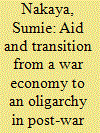

|
|
|
|
|
| Publication |
2009.
|
| Summary/Abstract |
Exclusion and violence persist in post-conflict states, despite international assistance aimed at the demilitarization of politics. Through a field-based study of Tajikistan, this paper argues that aid focuses on economic liberalization, not the implementation of peace agreements, in the initial stage of post-war transition. Such an organization of aid empowers a particular group of elites who have privileged access to state assets at the time of civil war settlement, allowing them to establish institutional frameworks that will consolidate their personal and monopolistic control of resources. This leads to the collapse of power-sharing arrangements, as the incumbent regime seeks to remove wartime commanders and opposition leaders from the administrative apparatus. In Tajikistan, the incumbent regime has also prosecuted many of these former allies and opponents on account of corruption through state agencies established with donor assistance. Aid thus institutionalized exclusion and sustains patterns of violence along civil war divisions, rather than transforming wartime power structures.
|
|
|
|
|
|
|
|
|
|
|
|
|
|
|
|
| 7 |
ID:
131354
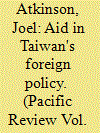

|
|
|
|
|
| Publication |
2014.
|
| Summary/Abstract |
Taiwan's foreign aid policy is largely a response to its China-imposed international isolation. Taiwan provides aid without stringent accountability conditions to countries in Africa, the Americas, and the South Pacific in order to maintain official diplomatic relations in the face of Chinese opposition. Often at odds with this is Taiwan's interest in seeking western support through being seen as a responsible aid donor. Domestic political constraints on Taiwan's aid budget accentuate the tension between these two interests. Taiwan's aid program can be seen as the product of these three competing and enduring pressures - maintaining the count of official diplomatic relationships, improving its international reputation, and containing aid spending.
Taiwan President Ma Ying-jeou's tacit 'diplomatic truce' with China - part of a wider warming of intergovernmental relations across the Taiwan Strait - has reduced significantly the squeeze between these three pressures on Taiwan's foreign aid policy. It has allowed the Ma administration to improve Taiwan's reputation, while maintaining or even reducing its aid expenditure, and still retain the same number of official diplomatic relationships. Nevertheless, the Ma administration has not wanted to alienate recipient governments while the prospects for the diplomatic truce with China remain uncertain. There remains considerable continuity with past practices, and the government's handling of aid as a foreign policy tool is still largely opaque and unaccountable.
|
|
|
|
|
|
|
|
|
|
|
|
|
|
|
|
| 8 |
ID:
057976


|
|
|
| 9 |
ID:
051907
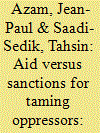

|
|
|
| 10 |
ID:
140334
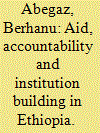

|
|
|
|
|
| Summary/Abstract |
Forty billion dollars of ODA over the past two decades has reduced destitution in post-socialist and post-conflict Ethiopia. It has also boosted the technocratic capacity of exclusionary state institutions, while doubly enfeebling the fledgling private sector and independent political and civic organisations. This aid–institution paradox is a product of an alignment of donor–recipient strategic interests. The five major donors pursued geopolitical and poverty reduction objectives; and the narrowly based ruling elite sought total capture of the state, ownership of the development agenda and use of pro-poor growth to leverage large aid inflows and to seek domestic political legitimacy. By coupling poverty reduction with adequate space for inclusive market, civic and political engagement, a farsighted coalition of donors could have complemented capacity building with the promotion of state resilience. Scaled-up aid can still be delivered, as in Eastern Europe, conditional on meaningful mutual accountability and the rule of law.
|
|
|
|
|
|
|
|
|
|
|
|
|
|
|
|
| 11 |
ID:
143633
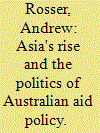

|
|
|
|
|
| Summary/Abstract |
The economic rise of developing Asia has given impetus to debates over the geographic orientation, strategy, organisation, and collaborative relationships of the Australian aid programme. This paper examines these debates, Australian government responses, and the politics underlying these responses. It points to, among things, the different ways in which the Labor Party and the Liberal–National Coalition have dealt with these issues, reflecting their different constituencies and foreign policy philosophies. The paper also assesses the future trajectory of Australian aid policy, in particular, the extent to which it is embracing the Chinese model of aid.
|
|
|
|
|
|
|
|
|
|
|
|
|
|
|
|
| 12 |
ID:
167638
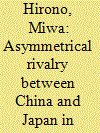

|
|
|
|
|
| Summary/Abstract |
To what extent is China–Japan rivalry a global phenomenon, and what is the nature of the rivalry they engage in outside their own region? Literature on Sino-Japanese rivalry abounds, but it pays scant attention to the relevance of the rivalry outside East Asia. This article argues that Sino-Japanese rivalry has indeed become a global phenomenon, that various forms of the rivalry are evident in Africa, and that they are mostly of an asymmetrical nature. Quantitatively, China’s contribution to Africa is far greater than that of Japan, with the exception of foreign direct investment (FDI). Qualitatively, though, Japan has a stronger sense of the rivalry than China has, revealing a psychological aspect to the asymmetry as well. Contextually, the types of activity that Chinese and Japanese actors carry out in Africa are not necessarily the same, which makes the rivalry all the more asymmetrical. The rivalry has become more apparent recently, not only because of the rise of China but also because of a change in the meaning of ‘Africa’ – from a region of ‘poverty’ and ‘hunger’ to a region of ‘economic opportunities’. That said, Africa – to a greater or lesser degree in each of its countries – still suffers from conflict and instability. As a result, the ability of Japan and China to exert power and influence throughout Africa is somewhat restricted.
|
|
|
|
|
|
|
|
|
|
|
|
|
|
|
|
| 13 |
ID:
086625
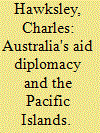

|
|
|
|
|
| Publication |
2009.
|
| Summary/Abstract |
Great powers seek to influence world affairs; middle powers seek to influence their regions. Australia's 'near abroad' includes Indonesia and the South Pacific, especially Melanesia. Elected Prime Minister in November 2007, Kevin Rudd has indicated a new direction for Australian policy in the Pacific and the previous image of a pushy or bullying Australia has to some extent been laid to rest. Yet the key differences between Rudd's policies and those of the former government of John Howard appear to be of style rather than substance. Despite the new rhetoric of greater engagement, the emphasis on market forces creating development shows an essential continuity of Australian foreign aid policy in the South Pacific.
|
|
|
|
|
|
|
|
|
|
|
|
|
|
|
|
| 14 |
ID:
069186
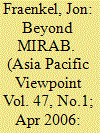

|
|
|
| 15 |
ID:
073002


|
|
|
| 16 |
ID:
119053
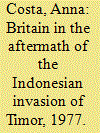

|
|
|
|
|
| Publication |
2013.
|
| Summary/Abstract |
This article fills a gap in the literature of international involvement in the aftermath of the Indonesian invasion of Timor-Leste by providing detailed documentary analysis of British conduct and motives. A substantial amount of scholarship has covered the role played by the United States and Australia during and after the Indonesian invasion of 1975. The lack of scholarly work specific to the role played by Britain during the first years of the Indonesian-Timorese conflict is regrettable as it represents a missing piece in the mosaic of international liability for one of the major massacres committed in the twentieth century. This omission has allowed the official British government version to survive, in which the country plays the role of an honest but ultimately unsuccessful broker working for a diplomatic solution between Indonesia and Portugal that would ensure the right to self-determination for Timor. The existing literature only offers a cursory challenge to this idea of British neutrality.
|
|
|
|
|
|
|
|
|
|
|
|
|
|
|
|
| 17 |
ID:
098756
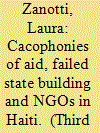

|
|
|
|
|
| Publication |
2010.
|
| Summary/Abstract |
The January 2010 earthquake in Haiti was a catastrophe not only for the loss of life it caused, but also because it destroyed the very thin layer of state administrative capacity that was in place in the country. This article argues that the fragility of the Haitian state institutions was exacerbated by international strategies that promoted NGOs as substitutes for the state. These strategies have generated a vicious circle that, while solving immediate logistical problems, ended up weakening Haiti's institutions. However, the article does not call for an overarching condemnation of NGOs. Instead, it explores two cases of community-based NGOs, Partners In Health and Fonkoze, that have contributed to creating durable social capital, generated employment and provided functioning services to the communities where they operated. The article shows that organisations that are financially independent and internationally connected, embrace a needs-based approach to their activities and share a long-term commitment to the communities within which they operate can contribute to bringing about substantial improvement for people living in situations of extreme poverty. It concludes that in the aftermath of a crisis of the dimension of the January earthquake it is crucial to channel support towards organisations that show this type of commitment.
|
|
|
|
|
|
|
|
|
|
|
|
|
|
|
|
| 18 |
ID:
138502


|
|
|
|
|
| Summary/Abstract |
This paper suggests that we may learn much about mainstream doctrines and practices of governance from watching what happens when they engage with international development issues. Cambodia is an illuminating example. Despite apparent material, organizational and intellectual superiority, Western engagement with poor countries often fails: Cambodia points us towards possible explanations as to why. The paper suggests that the lack of success in development intervention has had much to do with patterns visible in Western policy and governance doctrines: a desire to base the organization of interventions on cause–effect principles; an associated reckless application of imagined generic cause–effect relationships with little robust empirical foundation; and associated tendencies towards sectarianism.
|
|
|
|
|
|
|
|
|
|
|
|
|
|
|
|
| 19 |
ID:
072299
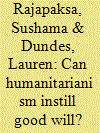

|
|
|
|
|
| Publication |
2006.
|
| Summary/Abstract |
One means of curbing anti-Americanism is to promote positive views of the United States and its people. The purpose of this study was to assess whether nearly a billion dollars pledged by the United States for tsunami aid instilled good will among Sri Lankans. Of 478 respondents, most considered both the American government (75%) and the American people (84%) to be generous. Half claimed that they liked the American people, a substantial increase over attitudes measured 2 years back, post-9/11. While fewer than half supported U.S. involvement in Iraq, the extent of this support increased significantly from post-9/11 levels, suggesting that humanitarian aid may result in broadened support for unrelated U.S. initiatives.
|
|
|
|
|
|
|
|
|
|
|
|
|
|
|
|
| 20 |
ID:
079675
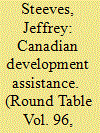

|
|
|
|
|
| Publication |
2007.
|
| Summary/Abstract |
A high degree of consonance exists between officials designing Canadian foreign aid and the political elites of African countries. Both share a commitment to Official Development Assistance and both articulate the identical basket of values underlying current aid policies. These shared values, however, lack resonance once one moves closer to the ground within the current African condition. Drawing on field research in the East African country of Kenya, the distance between the value rhetoric of officials/leadership and the actual situation is addressed. The distance is so great as to undermine the credibility of both aid policies and of those who propagate them.
|
|
|
|
|
|
|
|
|
|
|
|
|
|
|
|
|
|
|
|
|